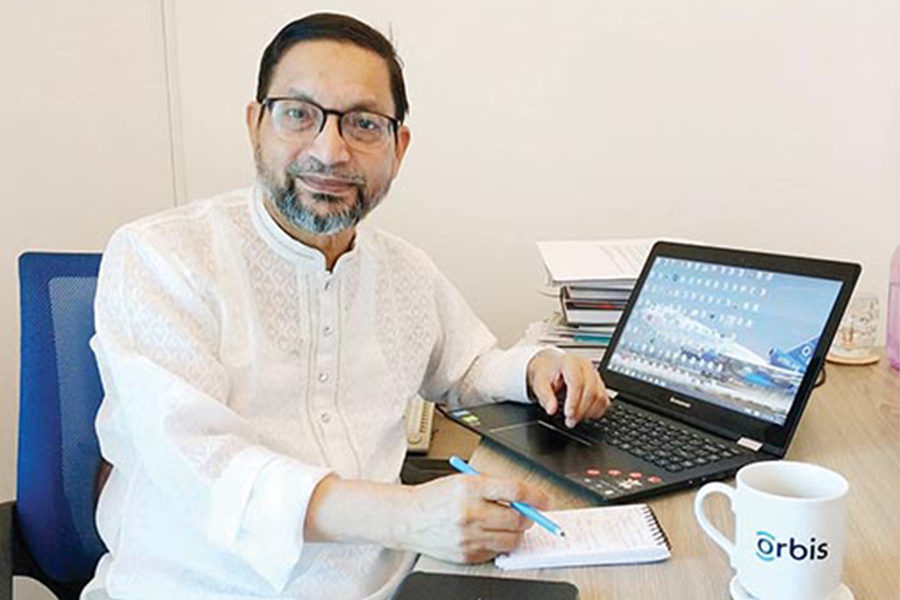Dr Munir wins Vision Excellence Award
Country Director of Orbis International for Bangladesh Dr Munir Ahmed has won the Vision Excellence Award 2020 for his contribution to Vision 2020, a global initiative to eliminate the main causes of all preventable and treatable blindness by 2020.
The International Agency for the Prevention of Blindness (IAPB) and World Health Organization (WHO) announced the award recently for 100 world leaders in eye health for the contributions of their vision, drive, commitment and quality of work to successful outcomes and continued learning from the Vision 2020 agenda, according to IAPB.
Vision Excellence Award is the only award given at the end of 20 years after the starting of Vision 2020 campaign where Bangladesh is a signatory.
Of the 100 recipients, three are from Orbis — Bangladesh, India and Mongolia.
In an announcement, IAPB said Dr Munir has been a vital and driven member of the Orbis community for almost a decade. “As a doctor with further training in tropical medicine and hygiene, management of public health and social development, Munir began his career with a great launch pad from which to tackle health concerns,” it said.
In an instant reaction after hearing the news of the award, Dr Munir said, “I’m feeling very honoured for the award. Actually, the award hasn’t come for my work as an individual; rather it has come for the work of my whole team [Orbis International Bangladesh].”
He said the award has obligated him and his team to take a renewed vow for making a greater contribution to the eye care sector in Bangladesh.
The IAPB announcement said that through Munir’s dedication, Orbis International Bangladesh has grown from providing 331,187 eye screenings and supporting 1,302 persons to receive eye health training in 2012, to three times as many outputs in 2019.
When Munir became country director of Orbis International, there were few established partnerships of the charity, which has now 23 direct partner organisations, including BRAC and Grameen, the announcement noted.
The agency said that having previously worked with UN agencies, local governments and non-governmental organisations across Bangladesh and Afghanistan, Munir directed his expertise towards fighting avoidable blindness.
“With a key focus on partnership building to develop effective programmes, Munir has supported Orbis to improve eye health services for communities who need it most,” it added.
IAPB noted that he has also been successful in influencing policy at the government level, advocating for the inclusion of childhood blindness, Retinopathy of Prematurity, Diabetic Retinopathy, Vision Centres and human resources for eye health within the country’s National Eye Care Plan.
“Orbis is considered a key organisation in eye care in Bangladesh. One of the amazing steps that has been taken, thanks to Munir and his team’s dedication, is the government’s recognition of the importance of vision centres,” the announcement said.
According to it, with plans to establish 200 vision centres through government resources, 50 are already up and running. As an extension of the work, Orbis-supported partners have established another 70, putting eye health at the heart of communities.
The announcement said through Orbis’s efforts specialised eye health services for children have also been greatly strengthened, with the development of new paediatric eye care centres, alongside a national level network.
“The opening of the first Retinopathy of Prematurity centre outside of the capital, Dhaka, has been a catalyst for more hospitals recognising the importance of dedicating resources to this condition. This year, Orbis was awarded a gold medal from a partner hospital for our novel contribution to the development of paediatric eye health,” it added.
In 2018, Munir and his team developed a programme to assist both refugees and the local host population in Cox’s Bazar.
Munir said, “Building strong partnerships with development organisations, embracing innovative technologies and empowering communities in eye care are crucial to achieve universal eye health coverage beyond 2020.”
Date: 23 december 2020
Source: Orbis
